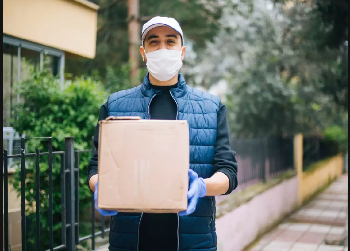While China reported several cases of frozen food packaging contaminated with the novel coronavirus this week, New Zealand said it is investigating the possibility that its latest Covid cases could be traced to imported freight
 According to the World Health Organization, the coronavirus can linger onpackaging material between hours and days, depending on the material,temperature and humidity. So what about delivered packages?While there is currently no evidence that people can catch Covid from foodor food packaging according to WHO, this view is also backed by the CDCand other government agencies.Coronaviruses cannot multiply in food – they need a live animal or humanhost to multiply and survive.Since the new coronavirus cannot replicate on the surface of food orpackaging, it can only become gradually weaker outside a living cell, saidJin Dong-Yan, virology professor at the University of Hong Kong.He, however, did not rule out that a person could spread dropletscontaining the virus on the surface of food, or a package, and someoneelse could then contract the virus by touching the surface and then theirmouth or nose. But such a case would be rare, he said.Infection from contact with a frozen virus through imported food “is still notto be considered a major route of infection and still not an event that shouldsubstantially affect policy at the public health levels,” said Eyal Leshem,director of the Center for Travel Medicine and Tropical Diseases at ShebaMedical Center in Israel.“The number of virus particles coming out a person’s mouth or nose is fargreater than a few virus particles remaining on frozen foods, somebodytouching it and then spreading it,” said T Jacob John, retired professor ofclinical virology at Christian Medical College, Vellore, India.“Among all the risks, I think these are very low risks.”Ki Mo-ran, professor of cancer control and population health at theNational Cancer Center, maintained it was not so easy to contaminatepackaging, and people should be safe as long as they wash their hands.“Just a small amount of virus is not that contagious ... the handles of apublic restroom could be more dangerous.”
According to the World Health Organization, the coronavirus can linger onpackaging material between hours and days, depending on the material,temperature and humidity. So what about delivered packages?While there is currently no evidence that people can catch Covid from foodor food packaging according to WHO, this view is also backed by the CDCand other government agencies.Coronaviruses cannot multiply in food – they need a live animal or humanhost to multiply and survive.Since the new coronavirus cannot replicate on the surface of food orpackaging, it can only become gradually weaker outside a living cell, saidJin Dong-Yan, virology professor at the University of Hong Kong.He, however, did not rule out that a person could spread dropletscontaining the virus on the surface of food, or a package, and someoneelse could then contract the virus by touching the surface and then theirmouth or nose. But such a case would be rare, he said.Infection from contact with a frozen virus through imported food “is still notto be considered a major route of infection and still not an event that shouldsubstantially affect policy at the public health levels,” said Eyal Leshem,director of the Center for Travel Medicine and Tropical Diseases at ShebaMedical Center in Israel.“The number of virus particles coming out a person’s mouth or nose is fargreater than a few virus particles remaining on frozen foods, somebodytouching it and then spreading it,” said T Jacob John, retired professor ofclinical virology at Christian Medical College, Vellore, India.“Among all the risks, I think these are very low risks.”Ki Mo-ran, professor of cancer control and population health at theNational Cancer Center, maintained it was not so easy to contaminatepackaging, and people should be safe as long as they wash their hands.“Just a small amount of virus is not that contagious ... the handles of apublic restroom could be more dangerous.”